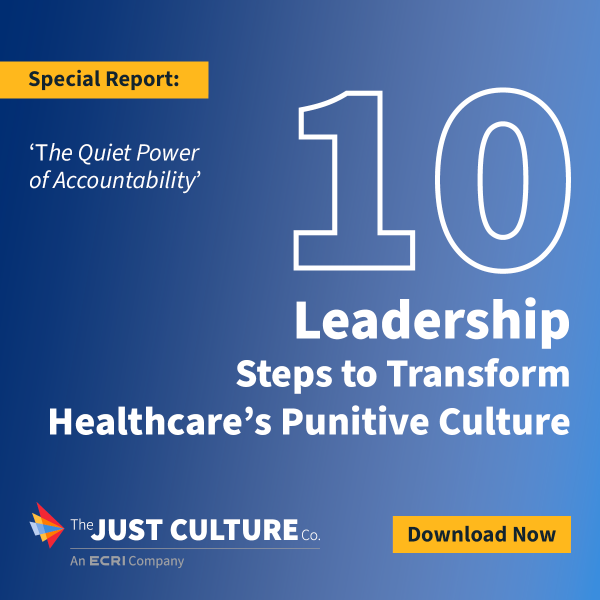BY ECRI PRESIDENT AND CEO, DR. MARCUS SCHABACKER, MD, PHD

Despite decades of work to advance patient safety nationally, the healthcare industry continues to perpetuate workplace cultures that miss the mark by seeking to punish rather than learn from employee mistakes.
When healthcare workers worry that they will be shamed or fired for reporting errors or unsafe practices, they tend to go silent and systemic problems are ignored. This not only puts patients at risk: it creates a toxic work environment that makes continuous improvement impossible.
Fostering a punitive culture in healthcare institutions creates conditions that hurt everyone—patients, healthcare providers, frontline workers, the institution’s leaders from C-suite to the board, and the broader health system.
The primary flaws that jeopardize patient safety and psychological safety for workers are rooted in human errors (mistakes that people make unintentionally, like a slip-up while functioning on “auto-pilot”) and at-risk behavior (which are choices made in good faith without appreciation of risk). Both errors and at-risk choices are part of the human condition. A better system of workplace justice recognizes and manages these inherent flaws.
When an approach to workplace justice punishes people for being human, as it does today in many healthcare institutions, you get these results, which are the hallmarks of a punitive culture:
- Suppresses error reporting.
When staff fear retaliation, they may be less likely to speak up about mistakes or hide them. This eliminates crucial opportunities to analyze what went wrong, improve safety, and prevent future harm. - Reduces patient safety.
When clinicians are afraid to speak up and report dangerous equipment, unclear protocols, or hazardous behaviors, critical safety issues go unaddressed. This increases the likelihood of preventable harm reaching the patient. Ironically, in trying to “hold people accountable,” punitive cultures may end up perpetuating the very harm they aim to prevent. - Undermines psychological safety.
In an environment where workers don’t feel safe to voice concerns or admit to challenges, communication breaks down. Collaboration suffers and innovation can stall. High-functioning healthcare teams rely on trust and openness, which are less likely to exist in a fear-driven workplace. - Increases staff burnout and turnover.
Constant stress from fear of punishment and exhaustion from swimming upstream inside faulty workflows can drive skilled professionals to leave not just their organizations, but the profession altogether, contributing to staffing shortages the industry is desperate to solve. - Stifles learning and system improvement.
A punitive approach focuses on assigning fault rather than understanding root causes and improving systems. This approach prevents making future progress, when leaders are focused on finding individual fault rather than seeking broader changes that could protect everyone. - Erodes trust in leadership.
Leaders who resort to punishment lose the confidence of their teams. When staff distrust leadership, morale deteriorates and the organization’s capacity for resilience and adaptability is weakened. - Damages reputation and compliance.
When problems are hidden instead of fixed, they eventually surface, often under the scrutiny of regulators, the media, or the public. The result can be costly fines, legal consequences, loss of accreditation, and lasting harm to an organization’s credibility.
To err is human. Punishing people for errors is punishing them for being human – and ignoring their effort to bring their “best selves” to work. As clinicians practicing in evidence-based disciplines, disciplines rooted in the scientific method, it is particularly troubling that we have had such a hard time accepting the inevitability of our own human error. Our colleagues in aviation and other higher-reliability industries like nuclear power have largely accepted this reality. They have pivoted to design systems that can reasonably withstand or recover from predictable human error.
In some cases, medical errors and adverse events are the result of an employee’s “workaround” in a workflow – like choosing to silence a device alarm or not verify a patient’s identity when pressed for time. A similar science-based argument can be made for why people choose these workarounds when it’s not possible to uphold competing expectations. Humans are wired to look for the best, creative, efficient way to get multiple things accomplished. This is an attribute, not a liability. But we see it as an unacceptable deviation when the choice results in a negative outcome. We need workers to speak up and disclose these choices so they can be vetted and can lead to system improvements – or provide clarity about why the seemingly reasonable choice contains risks that aren’t readily seen.
The cost of a punitive culture in healthcare is clear and it is high. Creating a just culture, where accountability is balanced with empathy and system improvement, isn’t just the right thing to do. It is essential for delivering safe, effective, and equitable care.


Transform Healthcare’s Punitive Culture
Ten Steps to Make Lasting Change For Patients & Workers
Dr. Marcus Schabacker recently co-authored a paper with colleagues from The Just Culture Company, “The Quiet Power of Accountability: 10 Leadership Steps to Transform Healthcare’s Punitive Culture.”

